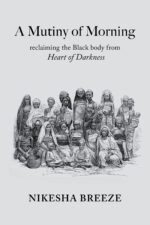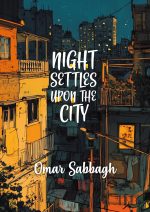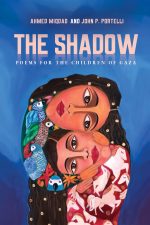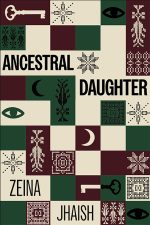Written with urgency out of a war-time Beirut, this poetry collection registers the griefs and the heroism of the Lebanese, under siege yet again. Sabbagh lends his lyrical voice here, to give a voice to the voiceless, trying to find some harmonic sense out of catastrophe. This book will compel readers, both Lebanese and those with any kind of human heart. While much of the work was written swiftly, on impulse, and almost like, as one of the poem’s title’s has it, a ‘War Diary,’ in verse, this work aims nonetheless to last in its significance and resonance at a time when the world as a whole (let alone Lebanon herself) has become so unpredictable, so fickle and so perilous. Night Settles Upon The City aims to be a worthwhile addition to the contemporary literature of war and, more specifically, to the literary representations of the modern Lebanese reality and experience.
Omar Sabbagh is a poet who is privileged to write about war and destruction from the relative safety of his study. But this double-edged illusion is insidious — mental and emotional inwardly, and physical for those who are directly under attack. It is visceral, political, heart-wrenching — yet the poet seeks out light and hope through the act of writing, for the sake of ownership and sharing. He may say that “I cannot read minds and nor / will I ever wish to”, but he writes for the importance of record-keeping, seeking solace, both private and public — as the Night Settles Upon The City of Beirut.
— Sudeep Sen, Winner of the Rabindranath Tagore Literary Prize
Omar Sabbagh has long brought us a world in which personal experience stitches a hyphen between the eastern Mediterranean and the northerly British archipelago. Now he makes the tension inherent within that richness explicit, in a love-letter to his family and home city of Beirut. Written while the ‘night’ of war ‘settles upon the city’, his introductory ‘Thoughts’ show us how unthinkable war remains, even when it arrives on the doorstep. This is a book of witness to what cannot happen, and yet does.
– Fiona Sampson, Professor Fiona Sampson MBE FRSL.Two-Way Mirror: The Life of Elizabeth Barrett Browning WW Norton 2022 – Washington Post Book of the Year, New York Times Editors’ Choice, finalist Plutarch Prize, finalist PEN Jacqueline Bograd Award, Sunday Times Paperback of the year.
The poet Omar Sabbagh lives in Beirut. His voice is playful, almost surreal at times. He talks of ‘the hairbrained monocle of war’ and suggests that if you live long enough in a place like Beirut ‘laughter becomes a lover’s distance-giving kiss’. Night Settles Upon the City offers us a poetry that is neither ideological nor partisan, not of the frontline but of a deeply threatened warzone. Its terms are easy-going, sorrowful, humane, formally intelligent and tinged with apprehension. It is humanity being human. Reading it is relief and hope.’
— George Szirtes FRSL, Eliot Prize winner.
Night Settles Upon the City by Omar Sabbagh is a profoundly reflective and evocative collection that blends personal experience with the brutal realities of life in a war-torn Beirut. Through a tapestry of poems, essays, and prose, Sabbagh explores the intersections of love, grief, intellectual contemplation, and the relentless backdrop of violence. The writing oscillates between moments of tender introspection and stark depictions of societal collapse, embodying a kind of philosophical meditation on suffering and survival. Sabbagh’s voice is distinctively lyrical, capturing both the intimacy of individual loss and the broader existential weight of conflict. His reflections on war and its aftermath are imbued with a sense of historical consciousness, yet deeply grounded in the immediacy of personal anguish and resilience. The collection is not just about bearing witness to destruction, but also about finding fragments of humanity amidst the ruins. A haunting and powerful work that invites readers into the fragile space between beauty and despair.
—Dr. Pamela Chrabieh, Kulturnest Co-founder & Managing Director
The Arabic term for poet means the one who feels, unlike the Greek origin of poetry, which describes the craft itself. Omar Sabbagh is the quintessential poet in the Arabic sense. In this collection, he vibrates with Beirut, where he now lives, at a time when the city’s famous cultural vibrations are overwhelmed by murderous quakes caused by the Israeli war machine.
—Gilbert Achcar, Professor of Development Studies and International Relations at SOAS University of London.
Beirut’s Omar Sabbagh, lover of beauty, poet of lush lyrical power, addresses the spirit of the great Dr. Edward W. Said in one poem, saying these troubled seasons make him “restless now in (his) resting place.” I’m captivated by a further description of Said, “living paper, breathing ink of one whose thoughts still seem to think.” There is healing in such sensitive recognition. Wise voices we always needed are suddenly needed desperately. Sabbagh invokes his love for a precious home frequently under siege and his care for all the people who made and surround him. Gratitude for the wisdom, kindness and rich affections of Night Settles Upon the City.
—Naomi Shihab Nye, recipient Lifetime Achievement in Poetry Award, the Wallace Stevens prize
In Night Settles on the City, Omar Sabbagh gives voice to the bewilderment, fear, rage, and despair so many of us in the Middle East are currently feeling. His eloquent, tender poems grapple with the impossibility—yet absolute necessity—of language at a moment when words otherwise fail. Like all the best poems, Sabbagh’s challenge, soothe, haunt, and rehumanize us, ultimately arousing our better selves.
—Mai Al-Nakib, author of An Unlasting Home and The Hidden Light of Objects
Both erudite and demotic, felt through the body and ‘guided by ear’ Omar Sabbagh’s voice powers through the remote attacks on Beirut – the city in which he currently lives – the hourly atrocities and unspeakable suffering to reach us and to speak for us. ‘What’s to understand?’ he asks ‘That murder can be finessed?’ In his seminal new collection, Night Settles Upon the City, night becomes a ‘dark and violent animal’ with its ‘panther’s pelt’ of terror ‘slowly curving round us’ through which we hear the voice of the aggressor reflecting that ‘…each murderous attack/ I order seems to drain this world of innocence.’ Yet Sabbagh’s own voice remains measured, balanced, especially in the portraits he paints of his beloved father…‘It gets worse each day watching him/ ageing’ (‘The Old Man and his Walking Stick’). This poem ends with the lines ‘an old man and his son, fighting a war/ in a warzone we all must visit’. Alongside unimaginable horror we are shown the ordinary griefs and losses that we all suffer – of ageing, of failing, of being human; and it’s the humanity and compassion with which Sabbagh bears witness that will secure this book’s future among the handful of classics that will come to define our era.
— Jenny Lewis, MA Oxon., MPhil., PhD, Tutor for Poetry, Oxford University










ArabLit
I want to start by saying I really enjoyed reading this novel. When I was away from it, I wanted to get back to this world, to re-immerse myself. A large part of that drive was Zakaria, who wants so much to do right in the world (even as he sometimes gets in a muddle, can be jealous and short-tempered). Was Zakaria based on a historical figure or historical sources? Or is he built from inspirations nearer to us in time?
Mohamed Seif El Nasr: Concerning Zakaria’s character, I believe it is a blend of what you mentioned. The critical thinking and rationality part of his character is based historically on Muhammad al-Abili, Ibn Khaldun’s tutor. Al-Abili, who was known throughout the Maghreb as the great master of the rational sciences, was a fascinating figure with unconventional views. He actively tried to avoid official posts throughout his life, famously refused to write books, and was heavily critical of the schooling (madaress) system at the time of the Marinid dynasty, which followed a curriculum imposed by the authorities and which, he believed, created restrained mentalities.
As for the morality part of Zakaria’s personality, his desire to do right in the world, and his struggle to understand the motives behind his desire to be moral, I believe my main inspiration was my own experience and that of my close friends. On the one hand, many of our generation here in Egypt had our moral compass sharpened during the Arab Spring, became driven by the desire to do right in the world, and tried to identify ourselves within the global political spectrum (which would naturally lead anyone to lean left). On the other hand, and this is heavily alluded to in the novel as part of Zakaria’s character development, once you try to associate yourself with people who are supposedly doing right in the world, there’s always the sad discovery, which would come sooner or later, that many of them are more motivated by egoism rather than love for the people and a genuine desire to help others—that depressing realization that social activism is oftentimes a mask for personal egoism—and then you find yourself questioning your own motives. ArabLit
Usman Butt
Then He Sent Prophets cuts across many issues that would be all too familiar to us today, but it also illuminates the past. Zakaria’s ideals and ambitions are both naive and relatable, wanting to remake the world and being weighed down by family and social obligations could be the tale of much university or college graduates the world over. The concerns that religiosity is lax, declining and those charged with educating people of their religious obligations are corrupt and distort the true message, is certainly a message that will resonate with many religious believers today. In some ways, it reminds us that our concerns are not new and are, in fact, as old as religion itself, these are the key themes that make the novel feel contemporaneous. Those seeking a book that speaks to present concerns will certainly find this novel to be just that, but it is also rooted in the past and so there are many elements that are so very different from our times. What made this novel fascinating to read was the blend of the two, while being firmly set in the past. Then He Sent Prophets is a fun, enjoyable, relatable and intriguing read and excellent work of historical fiction. — Usman Butt TheUsmanButt.
Sherine Elbanhawy
Mohamed Seif El Nasr’s debut novel, Then He Sent Prophets, is a sweeping historical narrative set in the 14th century, a period marked by the decline of the Marinid dynasty in Morocco and the tumultuous Emirate of Granada in Islamic Spain. It is a masterful blend of historical fiction, philosophical inquiry, and human drama featuring real historical figures like Ibn Khaldun, Pedro I, and Muhammad V. For example, Ibn Khaldun’s observation that “when a ruler makes his people too weak to keep their affairs going, their weakness recoils on him and weakens him” critiques Sultan Abu Salem’s governance, reinforcing the cyclical nature of oppression. This insight is paired with vivid depictions of medieval society, such as the fleeting legacy of Sultan Abu Salem: “Of the short reign of Sultan Abu Salem, people have a recollection of only two events: the giraffe from Mali and the day the overthrown king of Granada departed to reclaim his throne.” — Sherine Elbanhawy, Rowayat.org
Historical Novels Review, August 2025
“This is an interesting character—and emotion—driven novel of a time, place, and events not widely covered in Western literature, [with] surprisingly a number of genuinely humorous scenes. This book happily exceeded my expectations. Prepare to take part in the gamut of emotions from joy to excitement, tragedy, and love. Recommended.”
— Historical Novels Review, August 2025
Full review: https://historicalnovelsociety.org/reviews/then-he-sent-prophets/